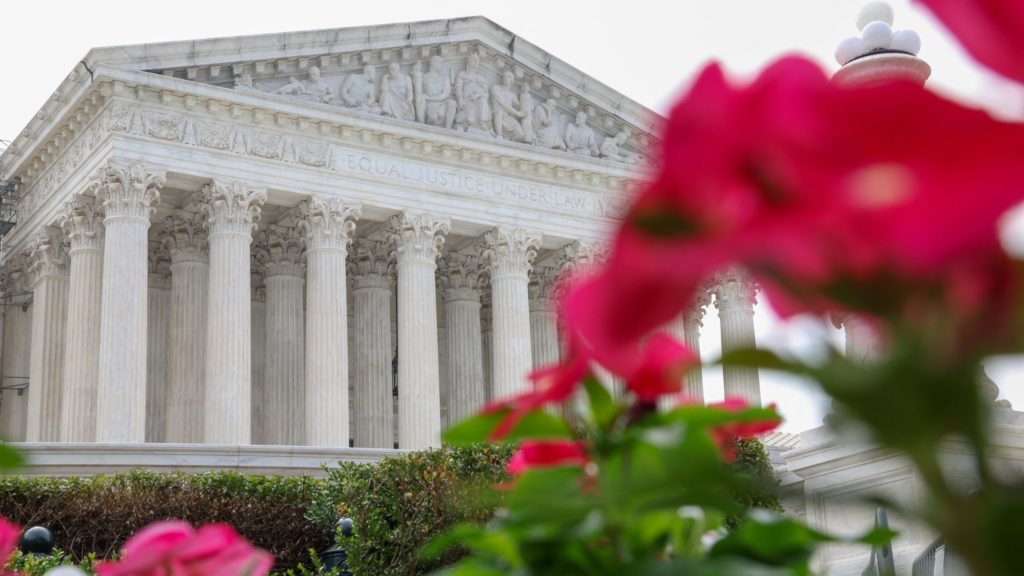Protecting the innocent "is a proper consideration" in the government regulation of firearms, the U.S. Conference of Catholic Bishops said an amicus brief filed with the U.S. Supreme Court in a case over whether the government can prohibit a person with a domestic violence restraining order from possessing a firearm.
In the fall, the court will hear oral arguments in the case, United States v. Rahimi.
Besides the USCCB, members of Congress and a number of faith-based organizations and other groups that advocate for victims of domestic violence also have filed amicus briefs in the case.
"As the Church teaches, and this Nation's historical traditions demonstrate, the right to bear arms is not an unqualified license that must leave vulnerable family members to live in fear," said the USCCB's amicus, or friend-of-the-court, brief, which was filed Aug. 22. "Abused victims are precisely the people whom a just government is tasked with protecting. The Second Amendment does not stand as a barrier to their safety."
The Biden administration petitioned the high court to reverse a ruling by the U.S. Court of Appeals for the 5th Circuit that invalidated one of the provisions of 18 U.S. Code Section 922 -- specifically 922(g)(8) -- that bars anyone "subject to a court order" in which they were found to be a threat to a domestic partner or child from possessing firearms.
"We filed the amicus brief to defend common sense firearm restrictions that recognize the inherent dignity of each person and are designed to provide protection for the vulnerable and to ensure peace in society," a conference spokesperson said in a statement emailed to OSV News late Aug. 23. "We also believe that the Church's long experience applying traditional principles to a changing world can be helpful to the Court as it considers whether a modern firearm regulation is consistent with the nation's legal tradition."
The case focuses on Zackey Rahimi of Arlington, Texas, who was issued a restraining order by a Texas state court Feb. 5, 2020, after his ex-girlfriend accused him of assaulting her. The order barred him from engaging in harassment-related behaviors toward the ex-girlfriend or her child. It also prohibited him from possessing firearms. He was told that violating the prohibition was a felony.
According to scotusblog.com, about a year later, while the restraining order was still in effect, Rahimi was a suspect in a series of shootings. When police officers executed a warrant at his home, the site noted, "they found (among other things) a pistol, a rifle, and ammunition -- along with a copy of the restraining order."
Rahimi was charged with a felony for possessing firearms, having been barred from having them because of the domestic violence restraining order he was under. His lawyers moved to dismiss the indictment on the grounds that 922(g)(8) is unconstitutional. The district court denied the motion and Rahimi pleaded guilty.
On appeal, Rahimi renewed his constitutional challenge to 922(g)(8). On Feb. 2 of this year, a three-judge panel of the 5th U.S. Circuit Court of Appeals agreed, overturning his conviction in light of the Supreme Court's landmark 6-3 decision in New York State Rifle & Pistol Association v. Bruen on June 23, 2022, striking down a long-standing public carry law in New York "and casting doubt on gun control laws around the country" as Politico reported.
Citing the Bruen ruling, the USCCB amicus brief said, "The Second Amendment is concerned primarily with 'the right of law-abiding, responsible citizens to use arms' for self-defense. ... Accordingly, the Nation's historical tradition of firearm regulation includes many provisions focused on preventing those deemed a danger to others from possessing firearms."
"Amicus accordingly recognizes the role that the duty to protect the innocent, and specifically victims of domestic violence, plays in the context of firearm regulation," the brief said.
"All of us must do more to end violence in the home and to find ways to help victims break out of the pattern of abuse," the brief continued, quoting the U.S. bishops' November 2000 statement "Responsibility, Rehabilitation, and Restoration: A Catholic Perspective on Crime and Criminal Justice." "As bishops, we support measures that control the sale and use of firearms and make them safer (especially efforts that prevent their unsupervised use by children or anyone other than the owner), and we reiterate our call for sensible regulation of handguns."
Quoting a USCCB April 3, 2019, letter to the Senate Judiciary Committee regarding reauthorization of the Violence Against Women Act, the brief added, "Amicus has also advocated for 'robust support' for 'law enforcement agencies so that they can better investigate, neutralize and hold accountable those who commit acts of domestic violence,' and supports 'measures to remove weapons, especially firearms, from persons who are deemed by courts to be threats to the people around them.'"

